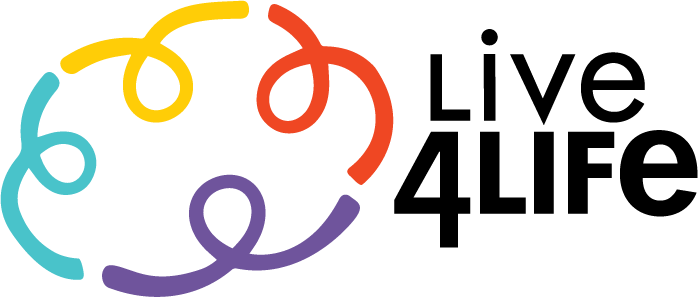Live4Life at Parliament House of Victoria
IMAGE CAPTION: Live4Life at a Parliamentary Breakfast on Thursday 20th November at Parliament House, attended by Minister for Mental Health, Ms. Ingrid Stitt and Minister for Health, the Hon. Mary-Anne Thomas, as well as other Members of Parliament, funding bodies and representatives of Live4Life communities.
Live4Life makes powerful case for investment in suicide prevention in Victorian rural and regional communities to ministers at Parliamentary Breakfast.
Support for youth mental health is urgently needed in Victorian rural and regional communities — and prevention programs are vital if we are going to make an impact.
That was the powerful message delivered by award-winning youth mental health organisation Live4Life at a Parliamentary Breakfast on Thursday 20th November at Parliament House, attended by Minister for Mental Health, Ms. Ingrid Stitt and Minister for Health, the Hon. Mary-Anne Thomas, as well as other Members of Parliament, funding bodies and representatives of Live4Life communities.
Legislative Assembly Speaker, the Hon. Maree Edwards MP, hosted the Breakfast and highlighted the importance of Live4Life’s work in rural electorates like her own and that of other MPs who attended the event. “We all know that young people in rural communities often face unique barriers to mental health support. Live4Life is specifically designed to reach those places where services may be scarce and stigma may run deep.” She went on to say, “It brings together schools, councils, health services, community organisations, parents and, most importantly, young people, to build a resilient, caring, community network.”
Live4Life CEO Bernard Galbally addressed the gathering with a clear-eyed assessment of what is now acknowledged as a growing problem worldwide. “Despite local, state and national efforts, we are experiencing a youth mental health crisis. The first thing we need to grasp is that we will never have enough clinicians, psychologists and social workers to meet demand. What we can do is give everyone in rural and regional communities the skills and knowledge to better support their own and others’ mental health and wellbeing. That is how we save young lives — prevention,” he explained.
The statistics are sobering. The ABS National Survey of Mental Health and Wellbeing shows that the prevalence of mental ill-health in young people aged 16–24 years has increased by 50% since 2007. Suicide is the number one cause of death of young people in Australia. In regional areas, the suicide rate is now more than 50% higher than major cities.
With legislation on the age of criminalisation very much a hot topic and Treasurer Jaclyn Symes recently highlighting the need to invest in young people’s health and wellbeing, Live4Life’s call for increased investment in youth mental health prevention also represents an opportunity to help reduce the risk of criminal activity.
Investing in mental health prevention programs for young people in rural and regional Victoria is a crucial strategy to reduce the risk of offending and address underlying drivers such as alcohol and drug use. Young people in rural and regional communities often face higher levels of social isolation, limited access to health and mental health services, and fewer educational and employment opportunities — all factors that can increase vulnerability to mental health challenges and risky behaviours.
Jeremy Wiggins, Live4Life Deputy CEO and Director of Strategy and Impact, said, “Evidence shows that early intervention and access to tailored mental health support can significantly reduce the likelihood of offending, improve wellbeing, and foster long-term positive outcomes for individuals and communities. By prioritising prevention and support, the Victorian government can not only reduce future criminal justice costs but also strengthen the social and economic fabric of rural and regional communities.”
The Live4Life program was established back in 2010 in the Macedon Ranges. The only model of its kind designed specifically for rural and regional communities, it has successfully led the way on providing a whole-of-community prevention approach which delivers real impact. Today, it has now been implemented in 13 rural and regional Local Government Areas across Victoria, and has been extended to a pilot community in Tasmania. Along the way, it has reached over 34,000 young people with evidence-based mental health education and trained more than 3,000 adults in Mental Health First Aid. Uniquely, it has also inspired over 1,800 students in Years 9&10 to volunteer as mental health ambassadors in their communities.
The Ministers heard from speaker Dr Lakshmi Neelakantan, Research Fellow from the Centre for Mental Health and Community Wellbeing, School of Population and Global Health at The University of Melbourne, who provided an overview of the evaluation work she and her team have been involved with across multiple Live4Life communities.
They also were given an insight to the transformational impact of the program from speaker Laura Crozier, a youth engagement worker, podcaster and mental health advocate, who was involved with Live4Life when growing up. Ms. Crozier gave a compelling account of her own journey in her teens and the impact the Live4Life program had on her and her friends. She said, “The community approach that Live4Life takes means that my experience and my struggle with mental health is not something that I have to bear alone. My mum, my brothers, my sports coaches, my friends, local youth workers — they are all equipped to see the signs and they all know that it's okay to talk about it. That community-based approach is truly life-saving for people like me who were afraid to speak up, but had people to support me to get the help I needed."
With multiple independent evaluations and proven outcomes, Live4Life is now included in the Victorian Government’s Suicide prevention and response strategy 2024–34 and its 3-year Implementation Plan (2024–2026). Significantly, Live4Life’s life-saving work is highlighted as an important case study in the final report of the Royal Commission into Victoria’s Mental Health System, showcasing innovation in community-led mental health solutions for young people.

















